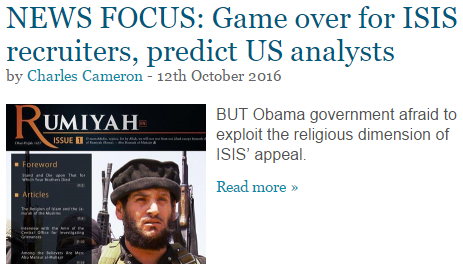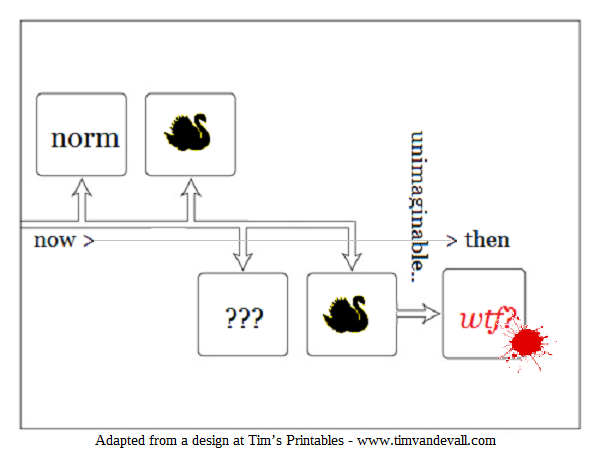[ by Charles Cameron — and detailing the scholarship of failed prophecy as context for ISIS’ upcoming loss of Dabiq ]
.
Here’s the opening of my piece posted two [now three] days ago on the LapidoMedia site:
ISLAMIC STATE (ISIS) has relied on a saying of the Prophet Muhammad to recruit its impressionable young idealists to kill for God.
But that prophecy could fail any day now, as alliance forces close in on the so-called ‘caliphate’.
Prophet Muhammad is believed to have stated that the first great battle of the Islamic end times would come when Western forces attacked – and were defeated – at a small town in northern Syria called Dabiq.
That should be any day now, according to ISIS’ Amaq News Agency. It issued a statement at the end of September that Turkish fire had killed a man in Dabiq, northern Syria, signalling the beginning of the end.

The trouble is, current reports indicate that allied troops are within a few days of capturing Dabiq, thus disproving the prophecy.
Let me say straight off — this is a complex and nuanced subject, and I hope to dig into it in greater detail shortly.
**
My piece had been edited — in journalism, that’s SOP — and appeared under the head and subhead:

Those are my editor’s words; my own emphasis is rather different. I don’t believe the fall of Dabiq will mean “game over” for ISIS recruiters, though I do think it will remove one major strand from their narrative — and experts are divided as ot its significance.
The point I particularly wished to make in the article is that if and when Dabiq falls to allied forces, as seems pretty likely in the very near future, it will be a case of the type investigated by Leon Festinger in his classic, When Prophecy Fails.
**
The prophetic hadith on which ISIS has relied, to such an extent that it named its major English language magazine after it, says that the Roman (ie “crusader”) forces will be decisively defeated when “the Romans would land at al-A’maq or in Dabiq”.
If my Google news feed is any good, the 21st century Battle of Dabiq hasn’t happened yet —

— but it’s close, and from a military standpoint it looks as though the “allied” forces will likely defeat ISIS, which would be quite a notable defeat for ISIS’ apocalyptic rhetoric on the face of it.
**
Here are four people who have their respective eyes on the situation:
Will McCants wrote the definitive treatise, The ISIS Apocalypse: The History, Strategy, and Doomsday Vision of the Islamic State. Here’s a paragraph largely drawn from that book (p. 105) as it appears in his most recent comment, ISIS fantasies of an apocalyptic showdown in northern Syria, dated October 3rd:
The fact that Turkish Muslims, not infidel Romans, control Constantinople today and are working with the infidel Romans against the Islamic State makes the Dabiq prophecy a poor fit for contemporary events. The inevitable defeat of the Islamic State at Dabiq, should it ever confront “Rome,” would also argue against the prophecy’s applicability. But in the apocalyptic imagination, inconvenient facts rarely impede the glorious march to the end of the world.
Imam Zaid Shakir, in Dabiq: An Argument Against ISIS in Jukly:
One of the most powerful recruiting tools of ISIS has been its ability to create an apocalyptic appeal around the prophesized destruction of a “Crusader” army at Dabiq, a location in Northern Syria. So central has this idea been to the call of the group that they have given their propaganda magazine the name of that place –Dabiq. It is now obvious that such a confrontation and the ensuing victory of the “believers” will not occur. What is their contingency plan? Apparently, sending waves of suicidal murderers out into the world to reap a grim harvest of innocent souls.
Tim Furnish, friend of this blog and frequent guest poster, spoke to this issue on A View from the Bunker 343: Dr. Timothy Furnish – Battle of Dabiq: First Shot in the Apocalypse or the End of ISIS? on October 9th. You can hear him on the Dabiq hadith from about the 3.23 mark. Around the 7.12 mark, Tim sets the stage:
ISIS believes that in these battles they are fighting in Syria, particularly, and specifically in and around Dabiq, they believe they are setting off the eschatological timetable for the Islamic conquest of the world. This is what they believe. And again, this is not particular to ISIS. These ideas have been around for a long time, and they have been shared by a lot of other Muslims, it’s just that ISIS, instead of just writing books about them, pining about them, is actually going onto the battlefield and trying to make them a reality.
The interview is a long one, and merits your attention — here I’ll just say that I summarized Tim’s point to him as “you appeared to downplay the significance of an ISIS defeat at Dabiq — did I get that right?” and he replied, “I did say that.” I’ll be interviewing Tim in further detail in the days to come, and report back.
Lastly, Daveed Gartenstein-Ross, a Senior Fellow at the Foundation for Defense of Democracies. I quoted him briefly in my Lapido piece, but here’s his full quote in answer to my request:
Whatever else it is, ISIS is an organization with a distinct theological outlook. It recruits using religious themes, and true believers feature prominently within its ranks. ISIS has anchored its rise and legitimacy to specific aspects of Islamic prophecy, and when its interpretation of this prophecy does not match reality, that will pose significant challenges for the organization — perhaps even existential challenges, if the group’s opponents play their cards right. (If ISIS fails, of course, that is not the same thing as jihadism itself failing.) Whether the U.S. government will be able to capitalize is a separate question, given that the U.S. shies away from messaging that touches on religious themes, and generally does not regard itself as a ‘credible voice’ in this regard.
**
I’d written this much at the point when Cole Bunzel‘s tweet yesterday turned up in my feed, and I quickly posted Cole Bunzel captures the Dabiq moment.
**
I am going to carry on here, a day later, with materials on Festinger’s When Prophecy Fails and later research along similar lines, because they offer us insight into the varieties of response that the failure of prophecy provokes in “true believers”. The simplest way to do this is to quote here the “Need to Know” coda to my Lapido piece:
End-times prophecies have an unfortunate habit of failing.
In Chicago, housewife Dorothy Martin persuaded her small group of followers that she had received a revelation from a planet named Clarion announcing the end of the world in a great flood on December 21, 1954.
The earth failed to be devastated, despite her followers selling up and moving to a mountaintop to await the end – but it did trigger a research programme into ‘cognitive dissonance.’
Martin’s small group could not accept their leader’s error, and instead went on a recruitment spree, according to expert Leon Festinger.
Others like the Millerites in 1843 recalculate the date, and hope again.
Jehovah’s Witnesses who have had to change the date of the Second Coming of Christ at least five times (in 1914, 1915, 1918, 1925, and 1975) are either abandoning the teaching, or spiritualizing the date.
The Japanese sect Ichigen no Miya, ‘internalized’ the suffering its founder had predicted: He attempted to commit seppuku, but his followers intervened.
He told them later: ‘I could see my own body as if it belonged to somebody else. I thought that I had managed to get out of my body at last, and I was greatly surprised to find that my body had changed itself into the islands of Japan and that a fire had broken out at its centre.
‘Then I knew that God had transferred the cataclysm to my own body. I thanked God and felt a bliss I had never experienced before.’
That last quote in particular is pretty stunning: you can read more on the topic in Takaaki Sanada and Edward Norbeck, Prophecy Continues to Fail: A Japanese Sect, or the Introduction to Jon R Stone, Expecting Armageddon: Essential Readings in Failed Prophecy.
**
Another point bears mention. You’ll note that the title of Festinger’s book is When Prophecy Fails — the focus is on the failure of prophecies to be fulfilled in time, on or by a “date certain”, and most if not all of the research that has followed it takes the same form. The Dabiq prophecy, however, deals with a place, not a date — something fairly rare and little discussed in the literature..
I mentioned this in a post to mailing-list I’m on, and Dr James Tabor of the Department of Religion, UNC Charlotte, commented (personal communication):
This is a very important and valid point—“place” is often every bit as important, or more important, than “time.”
Waco 1993 is a case in point, As Gene Gallagher and I show in our book, Why Waco, the key thing the FBI failed to understand was that David was not expecting any “apocalypse” in 1993—as his calculations pointed to 1995—and in Jerusalem—and that is essential—not in Waco, Texas. He thought he had to gather 144k faithful from around the world and everyone would meet in Jerusalem and fight in the final battle side by side with the Israelis.
Of course Jerusalem, in the ancient apocalyptic things I deal with, is absolutely essential as the “place” where it all comes down.
My friend and mentor Richard Landes (Encyclopedia of Millennialism and Millennial Movements, Heaven on Earth: The Varieties of the Millennial Experience, &c) similarly commented that the siege of Jerusalem in 1099, similarly, resulted in the disconfirmation of a place-based prophecy.
**
ISIS prepares for failure.
Cole Bunzel, in his June Jhadica post, The Islamic State of Decline: Anticipating the Paper Caliphate, quoted the late Islamic State’s official spokesman, Abu Muhammad al-‘Adnani, from May 21, 2016:
While in that statement ‘Adnani was sure to project a measure of confidence, remarking that the Islamic State is “becoming stronger with each passing day,” some of his comments betrayed the starker reality of a caliphate under siege. This was clear in the following queries: “Do you think, America, that victory will come by killing one or more leaders?” “Do you reckon, America, that defeat is the loss of a city or the loss of territory?” Responding to his own questions, ‘Adnani declared that killing the Islamic State’s leaders would not defeat the greater “adversary” — the group itself — and that taking its land would not eliminate its “will” to fight. Even if the Islamic State were to lose all its territories, he said, it could still go back to the way it was “at the beginning,” when it was “in the desert without cities and without territory.” The allusion here is to the experience of the Islamic State of Iraq, which between 2006 and 2012 held no significant territory despite its claim to statehood.
Scripturally, the Qur’an describes the Battle of Ubud, in which the Prophet Muhammad himself was wounded, and which the Muslims lost, in Sura 3 verse 166:
What ye suffered on the day the two armies met, was with the leave of Allah, in order that He might test the believers.
And again, as I pointed out in April of last year, Qur’an 2:154-56 concerns those who fight fi sabil Allah, suggesting they will encounter “tests” up to and including “loss of lives” in the course of events:
And do not say about those who are killed in the way of Allah, “They are dead.” Rather, they are alive, but you perceive [it] not. And We will surely test you with something of fear and hunger and a loss of wealth and lives and fruits, but give good tidings to the patient, Who, when disaster strikes them, say, “Indeed we belong to Allah , and indeed to Him we will return.”
Cole Bunzel‘s latest tweet indicates that ISIS is indeed using this line of argument..
The second issue of the ISIS magazine Rumiyah also sounds a note of preparation for defeat in the context of an article headed Paths to Victory:
The Prophet (saw) also guided us – with great detail – to both the causes for victory and the hindrances to achieving it.
The chief path to defeat is here said to be contention among leadership.
Finally, Cole Bunzel’s tweet yesterday gave us the first clue as to how ISIS is responding to the almost certain defeat in real time:
Date postponement.
As I mentioned in yesterday’s post, Dr Stephen O’Leary has the detailed run-down on how that strategy operated in Millerite rhetoric, in the immediate and longer-term follow up to the failure of Miller’s 1844 end times prophecy — giving rise to the Great Disappointment — while led, twenty years later, to the founding of the Seventh Day Adventist church, and The Watch Tower Bible and Tract Society (Jehovah’s Witnesses) about twenty years after that.
Twenty, forty years and counting.. and the Millerite ripples were only beginning..









